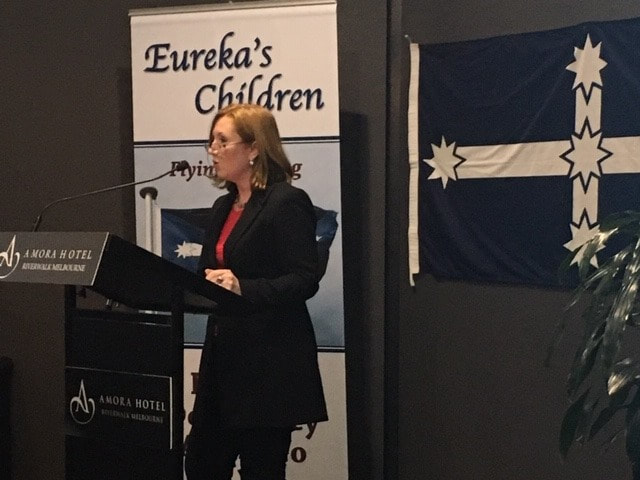|
The Eureka Centre has announced the launch of Talking History @ Eureka, an initiative to explore significant new research into the history of the Ballarat region, with a special focus on the colonial period.
Presented on the first Tuesday of each month, these free talks will present new perspectives on Ballarat and Goldfields history with a special focus on the events and legacy of the Eureka Stockade. Speakers include academics, writers, independent researchers and people from diverse fields who are engaged in exploring and reimagining Ballarat’s past. “There is a real hunger in the community for discussion and debate about our rich history,” Anthony Camm, Manager Eureka Centre said. The ‘Talking History’ series will focus on uncovering fresh new research and ideas about the past. “The monthly lectures will present the latest research on Ballarat’s colonial history, including some unexpected and recently revealed aspects,” Mr. Camm said. Join us at the Eureka Centre on the first Tuesday of each month at 5.30pm to hear guest speakers bringing our history to life. Entry is free and no booking is required. The first session is scheduled for Tuesday, 3 September. Popular Theatrical Entertainment, Eureka, 1854 In 1854, the Eureka area was a site of lively, and cosmopolitan, cultural entanglements. Diggers, prospectors, traders, storekeepers and entrepreneurs were joined by roving touring acts, catering for the human throng. The result was a dramatic overload of masculine, youthful and hedonistic energy concentrated within key venues. In this talk, Ailsa Brackley du Bois will introduce Ballarat’s theatrical scene, as it was, prior to the Eureka Stockade. Ailsa is currently completing a Masters of Arts in Writing & Literature (Deakin). Her thesis is titled ‘Lost Spaces of Popular Theatrical Entertainment, Ballarat Goldfields, 1850s-1870s’. Second Session – Tuesday 1 October 2019 Minefields of Memory: a history of interpreting Eureka With a past of contested memory, political jousting and history wars, interpreting and commemorating the Eureka Rebellion has often been contentious, passionate and a story in itself. At times the memory of Eureka had almost been forgotten, only to be resurrected by the diggers, Eureka ancestors, interested community members, politicians and media. In her talk, Felicity Martin will take you through the journey of our attempts to interpret the Eureka story through graves, dawn walks, monuments, gardens, cycloramas, diorama dramas, re-enactments and stockades, festivals, light shows, artefacts and our institutions, all contributing to the collective memory of Eureka.Felicity Martin is an independent curator, living in Talbot. She recently completed her Masters of Curating dissertation on the history of interpreting Eureka. She was Manager and Curator of Gallery Lane Cove for 11 years and worked briefly for the former Museum of Australian Democracy at Eureka.? Third Session – Tuesday 5 November 2019 George Higinbotham and Eureka – The Struggle for Democracy in Colonial Victoria George Higinbotham was a highly influential politician in colonial Victoria. One of his contemporaries described him as a man of ‘dash and daring who won from the privilege and class ground that they have never seen since been able to recover.’ Even today the debate rages about his character and his legacy. Some see him as a visionary who fought for responsible government free of Colonial Office Interface and obstruction, but an undemocratically elected legislative Council. Others see him as a flawed character whose legacy was turmoil. In this talk, author Geraldine Moore will explore the life of ‘the most loved and the most hated man of his day,’ and what this has to do with Eureka. Geraldine completed a Ph.D. at Monash University in 2016. Her thesis explored the early life of the controversial colonial politician, George Higinbotham. Her book, George Higinbotham and Eureka, was published in 2018. Our last year's Democracy Award winner Adele Ferguson has this week published her book 'Banking Bad: How Corporate Greed and Broken Governance Failed Australia'.
Few people were more instrumental in bringing about the Royal Commission into the banking and financial services industries than journalist Adele Ferguson. Through her exposes in print and on television, she pursued the truth about funds mismanagement, fraud, lack of probity, and the hard-sell culture that took over the finance industry after the deregulation in the 1980s. But it wasn't just light-touch regulators and crooked bankers growing fat on bonuses she put under the spotlight. It was also their victims - men and women who had lost everything and had no recourse when they discovered empty accounts, egregious fees, forged documents and broken promises. She says 'This is a book for every person with a bank account'. |
- Home
- About
- Membership
- Family Stories
-
Award
- 2023 - Hugh De Kretser
- 2023 - Phillip Moore
- 2022 - STEVE BRACKS
- 2019 - Tim Costello
- 2018 - Adele Ferguson
- 2017 - Patrick Dodson
- 2016 - Phil Glendenning AM
- 2015 - Father Frank Brennan
- 2013 - Museum of Australian Democracy at Eureka (M.A.D.E.)
- 2011 - Dr. Anne Beggs-Sunter
- 2010 - Margaret Rich
- 2009 - John Molony
- 2008 - Weston Bate
- News & Events
- Eureka Melbourne Democracy Walking App
- Eureka Story
- Ballarat Reform League Charter
- The Diggers March


 RSS Feed
RSS Feed
